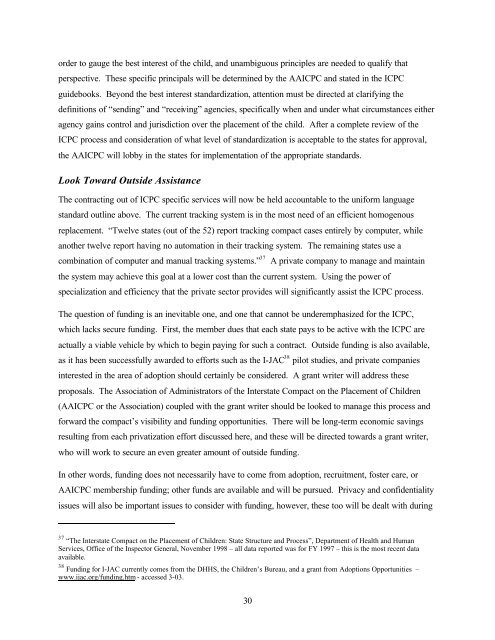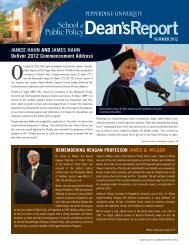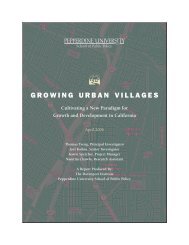Finding Permanent Homes for Adoptable Children - Pepperdine ...
Finding Permanent Homes for Adoptable Children - Pepperdine ...
Finding Permanent Homes for Adoptable Children - Pepperdine ...
You also want an ePaper? Increase the reach of your titles
YUMPU automatically turns print PDFs into web optimized ePapers that Google loves.
order to gauge the best interest of the child, and unambiguous principles are needed to qualify that<br />
perspective. These specific principals will be determined by the AAICPC and stated in the ICPC<br />
guidebooks. Beyond the best interest standardization, attention must be directed at clarifying the<br />
definitions of “sending” and “receiving” agencies, specifically when and under what circumstances either<br />
agency gains control and jurisdiction over the placement of the child. After a complete review of the<br />
ICPC process and consideration of what level of standardization is acceptable to the states <strong>for</strong> approval,<br />
the AAICPC will lobby in the states <strong>for</strong> implementation of the appropriate standards.<br />
Look Toward Outside Assistance<br />
The contracting out of ICPC specific services will now be held accountable to the uni<strong>for</strong>m language<br />
standard outline above. The current tracking system is in the most need of an efficient homogenous<br />
replacement. “Twelve states (out of the 52) report tracking compact cases entirely by computer, while<br />
another twelve report having no automation in their tracking system. The remaining states use a<br />
combination of computer and manual tracking systems.” 37 A private company to manage and maintain<br />
the system may achieve this goal at a lower cost than the current system. Using the power of<br />
specialization and efficiency that the private sector provides will significantly assist the ICPC process.<br />
The question of funding is an inevitable one, and one that cannot be underemphasized <strong>for</strong> the ICPC,<br />
which lacks secure funding. First, the member dues that each state pays to be active with the ICPC are<br />
actually a viable vehicle by which to begin paying <strong>for</strong> such a contract. Outside funding is also available,<br />
as it has been successfully awarded to ef<strong>for</strong>ts such as the I-JAC 38 pilot studies, and private companies<br />
interested in the area of adoption should certainly be considered. A grant writer will address these<br />
proposals. The Association of Administrators of the Interstate Compact on the Placement of <strong>Children</strong><br />
(AAICPC or the Association) coupled with the grant writer should be looked to manage this process and<br />
<strong>for</strong>ward the compact’s visibility and funding opportunities. There will be long-term economic savings<br />
resulting from each privatization ef<strong>for</strong>t discussed here, and these will be directed towards a grant writer,<br />
who will work to secure an even greater amount of outside funding.<br />
In other words, funding does not necessarily have to come from adoption, recruitment, foster care, or<br />
AAICPC membership funding; other funds are available and will be pursued. Privacy and confidentiality<br />
issues will also be important issues to consider with funding, however, these too will be dealt with during<br />
37 “The Interstate Compact on the Placement of <strong>Children</strong>: State Structure and Process”, Department of Health and Human<br />
Services, Office of the Inspector General, November 1998 – all data reported was <strong>for</strong> FY 1997 – this is the most recent data<br />
available.<br />
38 Funding <strong>for</strong> I-JAC currently comes from the DHHS, the <strong>Children</strong>’s Bureau, and a grant from Adoptions Opportunities –<br />
www.ijac.org/funding.htm - accessed 3-03.<br />
30












